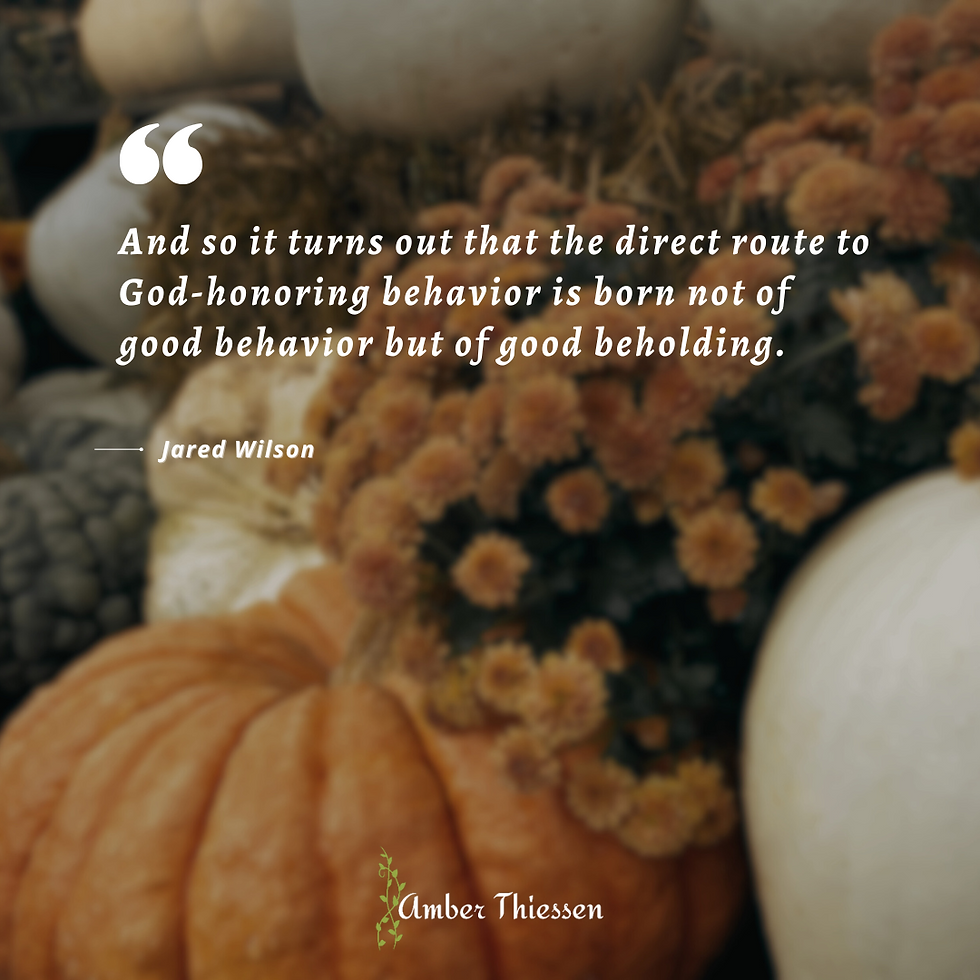Mosaic (Oct 3)
- Amber Thiessen

- Oct 3
- 4 min read

Somehow October snuck in through the front door. September was filled with back-to-school routines and then, so abruptly, with sorrow. Seasons keep shifting with a steady flow, despite our efforts or wishes for a pause. The warmth of this week makes it feel more like August—if not for the changing colors of the leaves (or the flies buzzing aimlessly inside the house). It feels like a gentle, slow fall, which seems to echo what my heart has been craving lately.
At church, we’ve begun studying the book of James with the ladies. And while I think I need gentle and slow, James doesn’t hold back. (The irony of thinking I know what I need!) As The Bible Project describes it, James is “a beautiful punch in the gut for those who follow Christ.”
If you’ve read the book, you know he starts by addressing the very place we all live: suffering. Whether we’re in the thick of it, looking back on it, or bracing ourselves for what will come again, God’s Word equips us with perspective and practices to carry us through.
Here’s what stands out as James invites us to look at trials through the lens of faith:
“When you face trials”
Not if. Not maybe. When.
Life after Genesis 3 means hardship is part of our common ground. We know this, but we also wish it weren’t so. Sometimes we even slip into believing that following Christ should bring an easy life—as if we were entitled to it.
But James shifts our thinking. He invites us to accept the reality of trials while also clinging to the promise of what is to come.
“Consider it joy”
Joy is rarely our first response to suffering. We’re never glad about tragedy, loss, or injustice. But joy is more than a feeling—it’s a mindset.
When I studied Philippians last year, I came across a definition of joy as an awareness of God’s grace and favor. That sticks with me. Despite the weight of trials, God’s goodness remains, His faithfulness endures, and His presence is constant. When we recognize His grace, we’re not walking with our faces turned away but lifted toward Him.
“The testing of your faith produces steadfastness”
Here’s another shift: trials are not wasted. They refine us. They reveal sin, expose unbelief, and in this way also grow endurance. God is at work in us through what we cannot see.
I picture it like this: on a cloudy, rainy day, my mood dips low, but the farmer next door is smiling at the answer to prayer. Or when the wind pelts my face with gravel on my walk, I grumble—but I know the farmer is thankful for the breeze drying his fields so the harvest can continue.
Moments I wouldn’t choose, but someone else sees as good. Trials can feel like that—painful to us, but producing something precious in God’s hands.
These three shifts—expecting trials, choosing joy, and trusting God’s refining work—reshape how we walk through suffering. James isn’t minimizing our pain; he’s reminding us of the bigger picture. Trials are not pointless. In Christ, even hardship becomes the ground where steadfast faith takes root.
Where are you being invited to shift your mindset—toward acceptance, toward joy, or toward trust in God’s refining work?
In Articles
The Dangerous Gift of Giving Advice | Lara d'Entremont
I appreciated Lara's thoughts on waiting before answering, to consider with wisdom, if or when it's the time to speak.
The Spreading Darkness of Assisted Suicide | Trevin Wax (TGC)
"Stanley Hauerwas has painted a vision of how we might stand out in a world of spreading darkness: “I’d say, in 100 years, if Christians are people identified as those who do not kill their children or their elderly, we would have been doing something right.” As nations enshrine autonomy unto death, the church must bear witness to the God who alone gives life, sustains it, and numbers our days."
Why We Need to Talk About Body Image in Women's Discipleship | Andrea Lee (TGC)
I'd agree this topic is really important to address in women's ministry, and that we probably don't enough. Women really into health & fitness may feel shunned by those who aren't, and vice versa. Whether that's us or not, discipleship issues are a matter of the heart and we can easily neglect to reflect on how what we believe about the body affects our pride and idolatry, our worship and beliefs. We may respond in judgement toward another as we fall into comparison traps. Let's strive as sisters in Christ for unity with each other and to think biblically about our bodies.
What You Owe Your Parents | Justin Poythress
Written to those who may be experiencing "parental deconstruction," where the parent becomes a villain in their story, he writes an encouragement to "embrace the humbling pang of givenness and dependance."
The Power of Prayer Meetings | Ligonier
Okay, if we'd take a show of hands, how many have attended a prayer meeting this week?? If you're living in a culture like mine, you'll notice that prayer meetings seem to be "uncool" and don't show up on our church schedule much anymore. There's probably at least a dozen reasons for this. But for me personally, I've really been making an effort to grow in prayer the last few months. In this article they share, "The great killer in the Christian life is not doubt...the thing that will destroy our faith is self-reliance." In revisiting some quotes I'd read a few years ago I was reminded, "To be prayerless, then, is to be faithless, unbelieving. Prayerlessness is practical atheism." (Brian G. Hedges, Watchfulness)
Strong words for us to digest and consider.





Comments